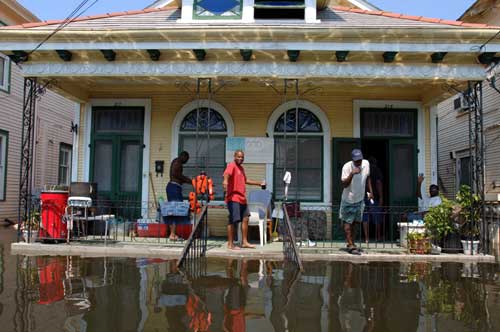
no dystopia here*
In an OPINION piece in Newsday this morning Patrick Moore writes about a subject which is extremely important to our understanding of both the reports of violence in a devastated New Orleans and the actual facts (not necessarily the same thing): drug and alcohol addiction. Even the most liberal elements of the media have largely avoided the subject of addiction and treatment in the poorest communities of the city.
Moore reminds us that, in addition to the parties already (morally) indicted, the guilt for this enormous tragedy must be shared by those who have addressed addiction and alcoholism as a criminal rather than a medical problem - for a hundred supposedly modern years in a supposedly modern nation.
For a week and a half I've watched many of my countrymen find ways to blame the people of New Orleans for their own "victimhood." Why did some people get it right away while others will go to their graves convinced that the folks remaining in the city got what they deserved? First it was about maintaining a smug distance from the dead and the sick and those who were trapped in their homes. Then it was condemning those who had to scavenge in order to survive in a world which had been abandoned by the more fortunate, and their were demands that "looters" be shot. Finally, it was about being absolutely assured that the thefts of durable goods and bodily violence only proved that the victims were fundamentally beasts feeding on each other in a Hobbesian jungle.
Moore shines some light on that putative dystopia in this excerpt from the article:
Storm waters dry up drugs
Without programs to treat addiction, it's no wonder the social fabric is torn to shreds
Many television viewers watching the aftermath of Hurricane Katrina last week found that their compassion soured as they watched the violence and looting in New Orleans. But what did those images really mean?
Disasters have a way of making hidden problems visible and, in this case, the effects of disproportionate addiction and alcoholism rates in poor, minority communities have been dramatically revealed. Already living in despair before the disaster, the looters were deprived of the "medicine" that made life bearable; violence was inevitable.
. . . .
When the president talks about "zero tolerance" for looters, he seems unable to recognize the conditions that produced their behavior. It's hard to imagine his drawing a connection between the violence of looting by desperate poor people living in addiction and his own economic policies. Yet, the brutality of his "compassionate conservatism" is evidenced by poverty levels rising under this administration while federal funding for drug treatment has gone down.
. . . .
The most successful rehabilitation programs are in-patient and last at least 30 days. During that time, patients are provided with counseling, medical care, psychiatric evaluation and job training. Transitional housing after treatment further enhances the chances of an addict staying sober and returning to a productive life.
This type of treatment is now mostly available only to the wealthy or those with private insurance. We need to widen the range of recipients. While rigorous treatment programs are expensive, experts agree that they are still far more cost-effective than law enforcement.
In America, the poor are disproportionately likely to be addicts and less likely to have effective treatment available to them. When these people are forced to come down hard, it's not surprising that some of them turn to violence. Law enforcement is not the answer. We need to reduce poverty in America and provide effective addiction treatment. We can no longer hide this problem or wait for the next crisis to deal with it.
*
the Newsday caption (undated) reads: Kevin Edwards, 42, his friend Daniel Mirenbe, 33, James Brown Jr., 50, who is brushing his teeth, and Dwayne Henderson, 36, sitting right, all refuse to leave their home.
[image by J. Conrad Williams Jr. for Newsday]